Saturday, September 27
Steve: We spent today catching up on errands (including a quick trip into Siena), schoolwork, laundry and travel logistics. It always surprises us how much time these all take, and need to remember that these kinds of days have to be planned and considered as part of all of our travel itineraries.
David and Katie were both very productive - David worked hard on math and reading, and Katie finished writing about medieval times (included below). Katie also completed another painting.
On the travel front, we completed our plans for Morocco. The more we read and hear, the more we're looking forward to the week we'll be spending there. We actually will be headed to Barcelona (from Provence) first, and will spend three days there before we fly to Marrakech. This actually was David's idea, and works out very well because the travel to Morocco is much easier through Spain. We also avoid the need to backtrack up to Barcelona after our week in Morocco. In Morocco, we'll spend five days in Marrakech, which is supposed to be an amazing city. Then we'll head to the coast for two days in a smaller town called Essaouira. After Morocco, we'll fly to Seville and plan to explore Southern Spain for five days before we drive up to Madrid. That will be our last stop before we fly home on November 7!
We now can look at a calendar see exactly where we'll be on each day for
the rest of the trip. This is a very new feeling for us. Until now, we've
simply had blocks of time written in for countries or areas. We've enjoyed
having flexibility in our plans - it's definitely made us feel very adventurous
at times. However, it's also nice to have the comfort of knowing that the
logistics are taken care of. We've had fun as a family studying the map and
developing our plans for this last portion of our trip - David's particularly
proud at having come up with our final itinerary.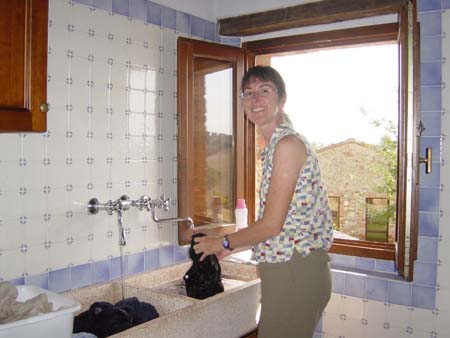
The only picture we took today was of Paula doing laundry in our kitchen sink (I did a lot of laundry also, but no one took a picture of me…). It's funny how we've often found ourselves thinking and talking about how laundry is going to fit in with our upcoming planned weeks (we've been in several places that were not conducive to getting laundry done). For example, we know that we'll have our own washer and dryer in Provence, so if we leave Italy with all clean clothes we can make it to Provence. Then if we leave Provence with all clean clothes, this will get us through Morocco (barely). That means that our only unresolved laundry need will come when we get to Southern Spain. Not too bad!
This afternoon we went back and looked at all the journal entries that we've written so far. We can hardly believe how many places we've been, and know that there's a lot more to see and do. Our first week in London seems like it happened years ago…
For our final dinner out in Tuscany, we returned to Vecchia Osteria, the restaurant here in Ponte a Bozzone where we ate our first night. We had another great meal, and sadly realized that this was going to be our last Tuscan dinner. We all decided that we'll be coming back again someday though, so that brought a little comfort.
Tomorrow we plan to spend our final day in the Tuscan countryside, perhaps repeating some of our favorite walks and explorations from this wonderful place.
Distance Walked: 1.03 miles
Katie's Komments... The topic for today is…My Impressions of the
Medieval Times and its Cities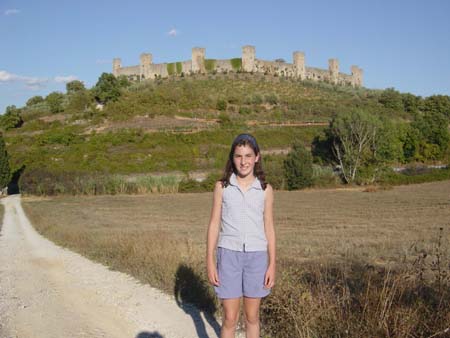
We have now seen a few good examples of medieval (middle age) towns, and know a fair amount about this time which lasted from 350 AD-1450. I have very mixed feelings about this period of time in which all Roman and Greek ideas were lost not to be reborn until the Renaissance era. The following paragraphs discuss my opinion about the lives of the people during the Middle Ages from my experiences on the trip so far.
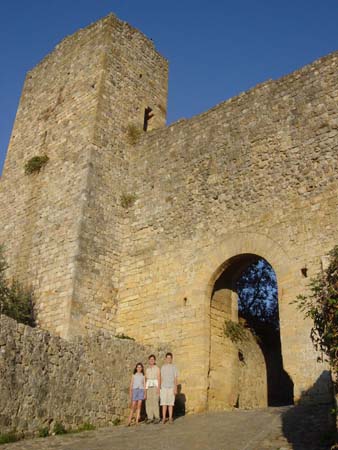 The
medieval times are best known for being very dark and violent. However, some
historians believe that this period had many achievements and discoveries,
and more knowledge was gained than lost. I have not learned enough yet to
have a really strong point of view on whether these times had a positive or
negative influence on its population, but I do feel this time was very different.
The previous civilizations such as the Greeks and Romans were all about the
arts, literature and philosophy but the Middle Ages seemed to be more about
religion, power of the church and fear. My opinion is that there were some
achievements during these times but mostly the horror of war and sickness,
lack of rights, and lack of religious diversity. Just walking through these
medieval towns and fortresses gives you a very dark and unforgettable feeling.
The
medieval times are best known for being very dark and violent. However, some
historians believe that this period had many achievements and discoveries,
and more knowledge was gained than lost. I have not learned enough yet to
have a really strong point of view on whether these times had a positive or
negative influence on its population, but I do feel this time was very different.
The previous civilizations such as the Greeks and Romans were all about the
arts, literature and philosophy but the Middle Ages seemed to be more about
religion, power of the church and fear. My opinion is that there were some
achievements during these times but mostly the horror of war and sickness,
lack of rights, and lack of religious diversity. Just walking through these
medieval towns and fortresses gives you a very dark and unforgettable feeling.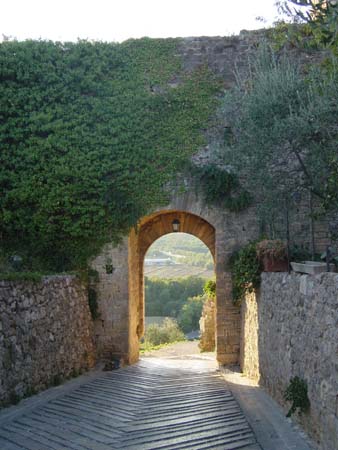
One thing about the Middle Ages that feels dark to me is the overwhelming amount of fears that the people had. They were constantly under the threat of being invaded and experienced violent conflicts between the kings and popes. They also had the threat of losing their land and home, and possibly the worst threat of all was of plague which would lead their walled-in city inhabitants to a long and gruesome death. They were surrounded by these fears-walls to keep them safe from invaders and watch towers made it hard to forget about these concerns and enjoy life.
Why were they willing to live in these cities and put up with the ideas and
actions of the kings and popes? The rulers understood how unhappy the people
were and so they constantly reassured them that the real and important life
was after death. The life they were living in at that time was only preparation
for going to heaven and living the happy and 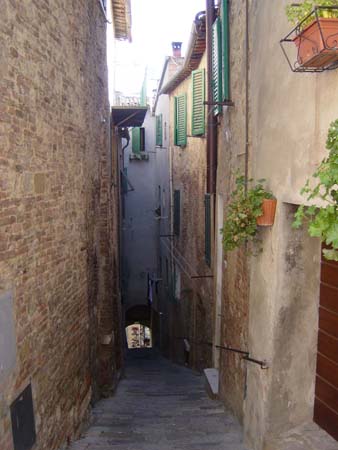 meaningful
life. As a result, the people grew less fearful of their deaths and worked
hard to make the cathedrals and castles as beautiful as possible to be closer
to God and the happy after life. This was the only philosophy during the Middle
Ages, and if you didn't exactly agree and practice it you were most likely
to be burned at the stake. This horror and violence permeated people's lives
throughout the Middle Ages. There was no religious diversity - no one was
treated as an individual and the only way in whi
meaningful
life. As a result, the people grew less fearful of their deaths and worked
hard to make the cathedrals and castles as beautiful as possible to be closer
to God and the happy after life. This was the only philosophy during the Middle
Ages, and if you didn't exactly agree and practice it you were most likely
to be burned at the stake. This horror and violence permeated people's lives
throughout the Middle Ages. There was no religious diversity - no one was
treated as an individual and the only way in whi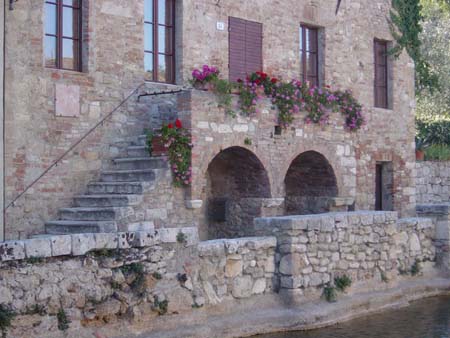 ch
people were connected was their beliefs on how God ruled everything and everyone.
ch
people were connected was their beliefs on how God ruled everything and everyone.
As I said, I do believe there were some achievements during this time, such
as the feudalistic order, but unfortunately these pyramidal societies frequently
lead to violence and corruption. If you compare these societies to the ingenious
democracy that the Ancient Greeks came up with I believe it wasn't a very
fair or unique governing method. I also believe that the castles and cathedrals
that the people built were beautiful and the structure was very creative.
I don't believe, however, that they had the ingenious ideas about building
cities like the Ancient Romans did-all of the medieval cities 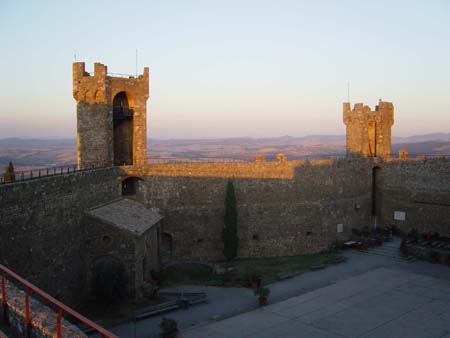 we
have been to have dark and narrow streets creating a sense of tightness and
tension unlike the Ancient Roman and Greek illusions which give the cities
a sense of space and relaxation.
we
have been to have dark and narrow streets creating a sense of tightness and
tension unlike the Ancient Roman and Greek illusions which give the cities
a sense of space and relaxation.
All in all, I believe that the medieval times were not times of understanding of the world, but a loss of the unique ideas of the ancient civilizations. They gained power by force, and not by strategy and knowledge of how humans wanted and were meant to live. Please remember that my opinion is one of many different views on this very debatable period of time. I believe that these were times of loss and almost everything about them was dark, but some people believe it was a time of understanding about God and heaven. There is not a right or wrong answer and this era in time will remain a mystery forever.
